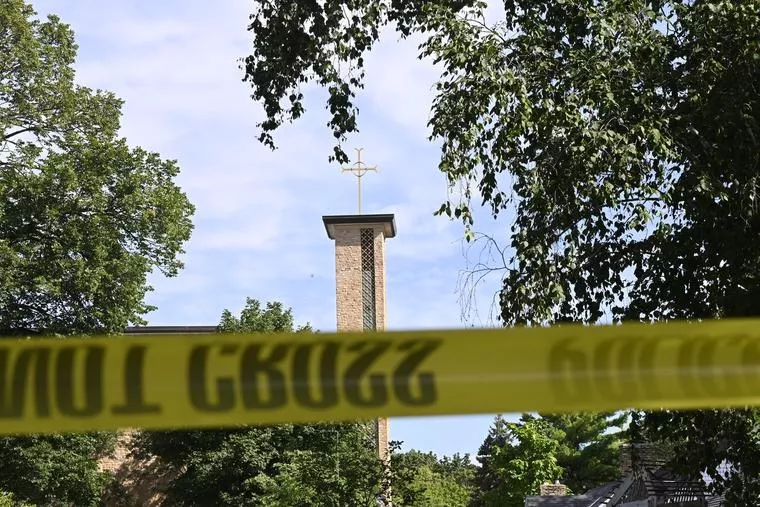
COMMENTARY: In this life we seek to accompany and pray for those who suffer.
SIGN UP FOR OUR NEWSLETTER HERE
One of the great mysteries to believers and nonbelievers is that of evil and suffering. If there is a God who is omnipotent and omniscient, how can he tolerate evil, injustice and the suffering of the innocent — including this week: Children were killed and injured while praying at an all-school Mass in Minneapolis, Minnesota (USA).
Why does God allow innocent people, even children, to suffer so?
The problem of evil cannot be answered simply. It is a mystery. Its purpose and why God permits it are caught up in our limited vision and understanding. Scripture says, “All things work together for the good of those who love and trust the Lord and are called according to his purposes” (Romans 8:28). But in many circumstances, it is difficult for us to see how this is so.
Anyone who has ever suffered a tragic and senseless loss or observed the disproportionate suffering that some must endure cannot help but ask, “Why?” And the answers aren’t all that satisfying, for suffering is ultimately mysterious in many ways.
I understand and respect despair’s depth and the dignity of such questioning.
Perhaps the most perplexing aspect of suffering is its uneven distribution. Some people seem to skate through life easily, while others endure suffering, disease, inexplicable and sudden losses, financial setbacks, injustice and other burdens. Some suffering seems completely unrelated to personal choice or sin — or any reason at all.
A respectful exposition of the Christian understanding of evil might include some of the following points. Note that these are not explanations per se (for suffering is a great mystery).
Even in the paradise of the Garden of Eden, the mystery of evil lurked. In a way, the tree and the serpent had to be there because we were made to love; love requires freedom, and freedom requires choices. The “Yes” of love must permit the “No” of sin. In our rebellious “No,” both we and the world unraveled, and death and chaos entered in. Paradise was lost and a far more hostile and unpredictable world remained. From this came all of the suffering and evil we endure. Our sins and the sins of others cause an enormous amount of suffering on this earth — the vast majority of it, by my reckoning. The suffering caused by natural phenomena is also linked to Original Sin.
Our Savior, Jesus Christ, meets us at the crossroads of suffering and death and, not exempting himself, allows suffering and death to have a redemptive meaning, a way back to him and a road to glory.
This link of evil and suffering to human freedom also explains God’s typical lack of intervention in evil matters. Were God to intervene routinely, it would make an abstraction of human freedom and thus remove a central pillar of love. But here, too, there is mystery: The Scriptures recount that God did sometimes intervene to put an end to evil plots, to turn back wars, and to shorten famines and plagues. Why does he sometimes intervene and sometimes not? Why do prayers of deliverance sometimes get answered and sometimes not? Here, too, there is a mystery of Providence.
The lengthiest biblical treatise on suffering is the Book of Job. In it, God showed an almost-shocking lack of sympathy for Job’s questions about his suffering and set a lengthy foundation for the conclusion that the mind of man is simply incapable of seeing into the depths of this problem. God saw fit that Job’s faith be tested and strengthened. But, in the end, Job was restored and reestablished with even greater blessings in a kind of foretaste of what is meant by heaven.
Our sufferings purify us
The First Letter of Peter also has a partial explanation of suffering: As 1 Peter 1:6-7 recounts, our sufferings purify us and prepare us to meet God.
Does this mean that those who suffer more need more purification? Not necessarily. It could also mean that a greater glory is waiting for them. Suffering “produces” glory in the world to come. Those who suffer more, but with faith, will have greater glory in the world to come.
Regarding the apparent injustice of uneven suffering, it should be noted that the Scriptures teach of a great reversal, in which the last shall be first (Matthew 20:16), the mighty will be cast down while the lowly are exalted, and the rich will go away empty while the poor are filled (Luke 1:52-53).
Finally, as to God’s apparent insensitivity to suffering, we can only point to Christ, who did not exempt himself from the suffering that humanity chose by leaving Eden. He suffered mightily and unjustly but also showed that this would be a way home to paradise. In this regard some also question that, if God is love, why does he let terrible things happen? It does not seem to be very loving. However, there is a tendency today to equate love with mere kindness. God who is love has to lead us through some difficult patches in this “paradise lost” in which we live. It is, however, a firmly held truth that God never permits suffering or evil except that he can bring greater good out of it.
St. Thomas Aquinas addressed the mystery of iniquity and suffering by speaking of our inability to see the whole picture. He imagined a great painting with only a few pixels, or a mere brushstroke of dark colors. “What is this dark ugliness?” we might cry out. But if we could back out and see the whole picture, we might come to understand that it is a play of light and darkness and that the darkness frames the light and gives way to it.
To these points I am sure you will add but be careful with the problem of evil and suffering. It has mysterious dimensions that must be respected. The Christian struggle to come to grips with this may be the best way. The “answer” of Scripture requires faith, but it also appeals to reason and calls us to humility before a great mystery of which we can see only a small part.
In the end, why is there suffering and evil in the world? We don’t fully know. But why is there love, loyalty or beauty? Why is there anything at all? These sorts of questions are imponderable, questions with no exact or certain answer. But God knows — and he will requite every injustice.
In this life we seek to accompany and pray for those who suffer. This is part of the good that God seeks to draw from tragedies. Friendships and alliances form; people make new commitments to build a more just world and to reject the violence and lack of regard for human life that is too evident today.
Only light can drive out darkness; only love can conquer hate.
As we mourn recent tragedies, including the intense suffering of the Annunciation Catholic School community, we can trust the Lord’s promise: “Blessed are those who mourn, for they will be comforted” (Matthew 5:4).
This was adapted from a 2022 Register piece.

Msgr. Charles Pope is currently a dean and pastor in the Archdiocese of Washington, DC, where he has served on the Priest Council, the College of Consultors, and the Priest Personnel Board. Along with publishing a daily blog at the Archdiocese of Washington website, he has written in pastoral journals, conducted numerous retreats for priests and lay faithful, and has also conducted weekly Bible studies in the U.S. Congress and the White House. He was named a Monsignor in 2005.







